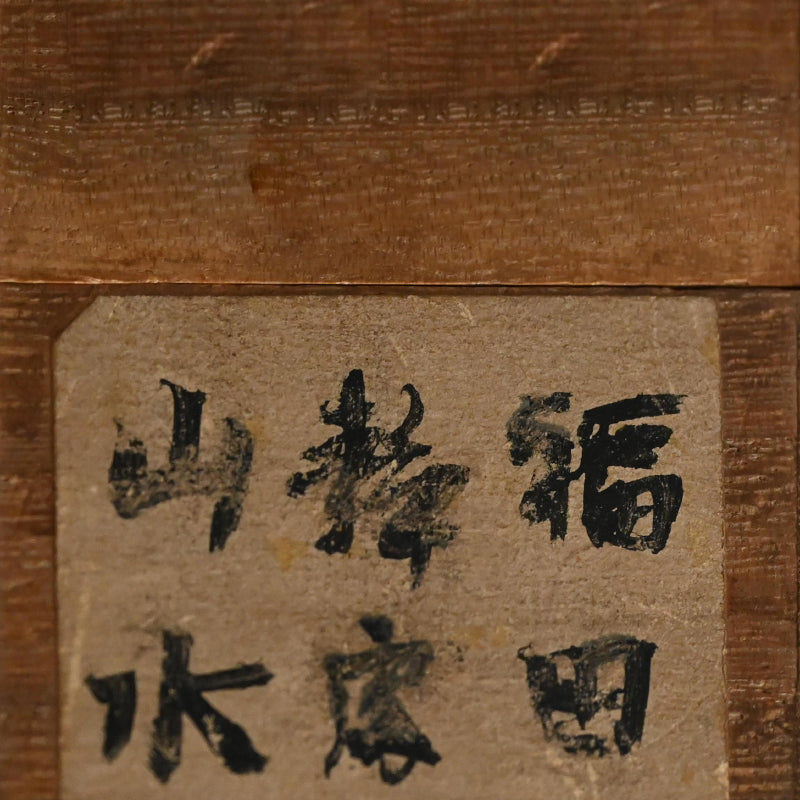Huge Ink Landscape 1915 ー福田 古道人 “霞江仙居図”
Huge Ink Landscape 1915 ー福田 古道人 “霞江仙居図”
Item Code: 古33
Couldn't load pickup availability
This monumental hanging scroll by Fukuda Kodojin dated early winter 1915 presents a lofty mountain landscape enveloped in drifting mists, a consummate expression of his mature literati ideal. Combining the monumental grandeur of Chinese Song and Yuan prototypes with the delicacy and introspection of Japanese Bunjin taste, it reveals Kodojin’s unique capacity to merge spiritual vision with expressive abstraction. The composition ascends dramatically from the foreground to towering peaks that dissolve into pale mist. A thatched hermitage clings to a ledge midway up the mountain, and below, a tiny boat drifts through swirling vapors, creating a profound sense of scale and solitude. Kodojin renders the craggy cliffs and luxuriant trees through a dense interplay of stippled ink dots, textured strokes, and layered washes registering his mastery of brush technique. This work epitomizes Kodojin’s mature style: boldly patterned, rhythmically breathing, and metaphysical in tone. His brush evokes not a specific geography but an inner mountain realm, a vision of reclusion that is both poetic and philosophical. Through the dialog of ink and emptiness, he transforms inherited idioms into something distinctly modern and deeply personal. The painting thus stands as a culmination of the Bunjin ideal in modern Japan, where painting becomes an act of self-cultivation, a meditative correspondence between the artist’s inner spirit and the natural cosmos. Ink on paper in patterned olive silk with white piping featuring large ivory rollers enclosed in a period wooden box. The ivory rollers will be changed if exporting. It is 64.7 x 233 cm (25-1/2 x 92 inches) and is in overall excellent condition.
A possible translation of the poem is:
Though I have long departed from the sweetness of worldly favor,
never have I seen dragons stretch their length in the clouds.
Heaven, so long as it abides, preserves the will of those who aspire.
The virtuous heart, unlost, hides its gems deep within the mountain.
Where ancient spring still stirs beneath moss and stone,
I find for a moment the joy of a tranquil mind.
Fukuda Kodojin (1865-1944) was an eccentric self-taught artist, his status as a poet, calligrapher and literati artist has reached legendary status. Born at a time of great change (4 years before the final fall of the Edo Government), he lived through the westernization of Meiji, Taisho Democracy, the rise of Imperialism and final defeat of the Showa eras. He was part of a small group of artists existing outside conventional circles in pre-war Japan. He moved to a village outside of Kyoto in 1901, where he supported himself and his family by privately tutoring those who wished to learn Chinese-style poetry. Kodojin was simply a scholar. His poetry, painting, and calligraphy all stem from a life-long cultivation of the mind. He was said to have taken the time just before his death to destroy the large portion of his own remaining work, leaving only that which must have met some personal criteria. Kodōjin’s paintings and calligraphy survive mainly in private collections, but significant works can be found in the collections of the British Museum, Freer Sackler Gallery of the Smithsonian Institute, Honolulu Museum of Art, Houston Museum of Fine Arts, Kumamoto Prefectural Museum of Art, Minneapolis Institute of Art, Museo Kaluz, New York Metropolitan Museum of Art, Portland Art Museum, Seattle Art Museum, St. Louis Art Museum, Tanabe City Museum of Art and Wakayama Prefectural Museum of Art among others including such well known Private collections as the Cowles Collection, Hakutakuan Collection, Manyoan Collection and Welch Collection. Twenty five paintings by the artist formed a private exhibition (from the Gitter-Yelen collection) at the New Orleans Museum of Art in 2000. In recent years, exhibitions such as The Last Master of the Literati Tradition: Fukuda Kodōjin (Minneapolis Institute of Art, 2023) have brought renewed attention to his achievement. For more on his life see the book Old Taoist, or Unexplored Avenues of Japanese Painting.
Share














































